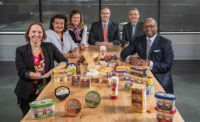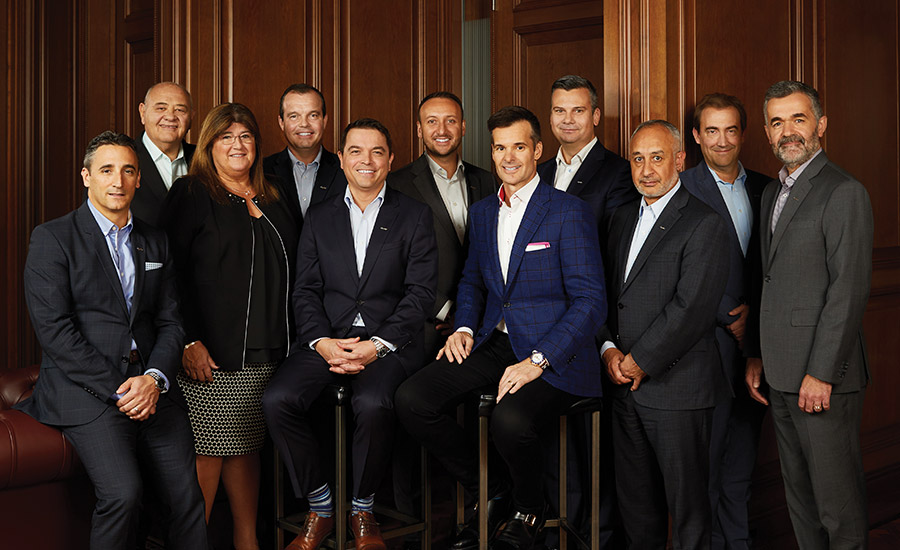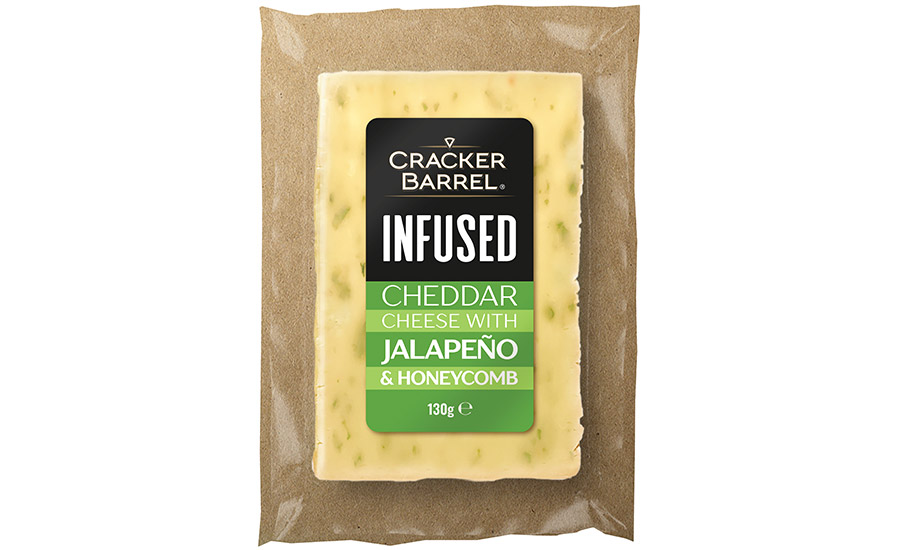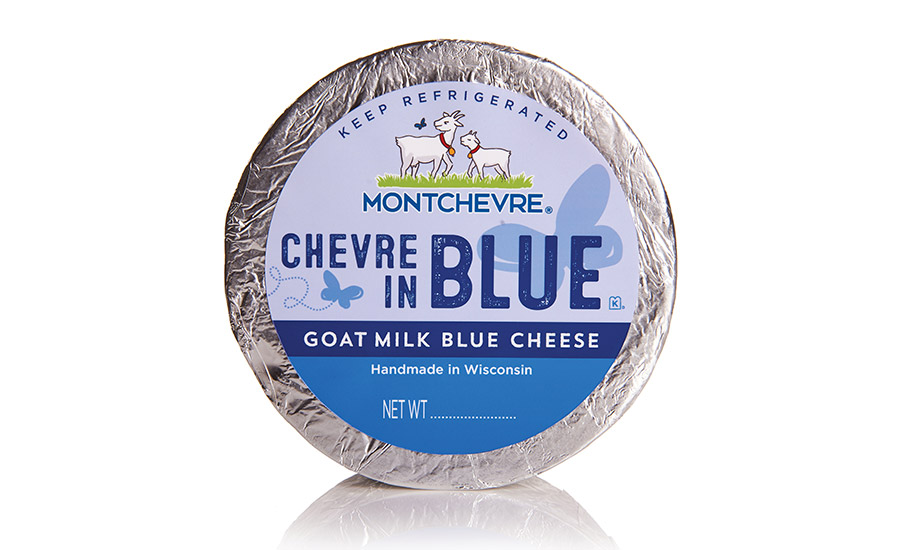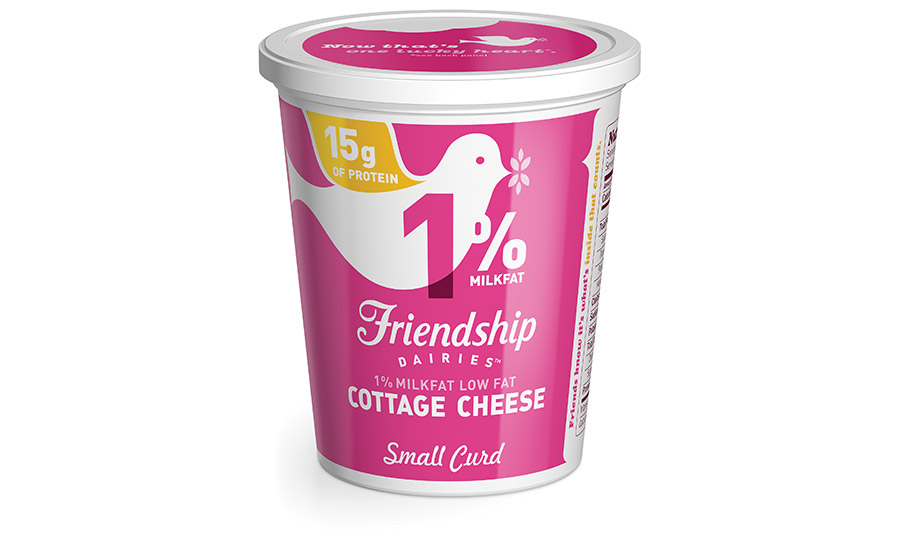2019 Processor of the Year: Saputo Inc., a giant in more ways than one
Saputo Inc. is to be admired for its impressive growth via acquisitions, investments in assets and innovation, and commitment to supporting the communities in which it operates.
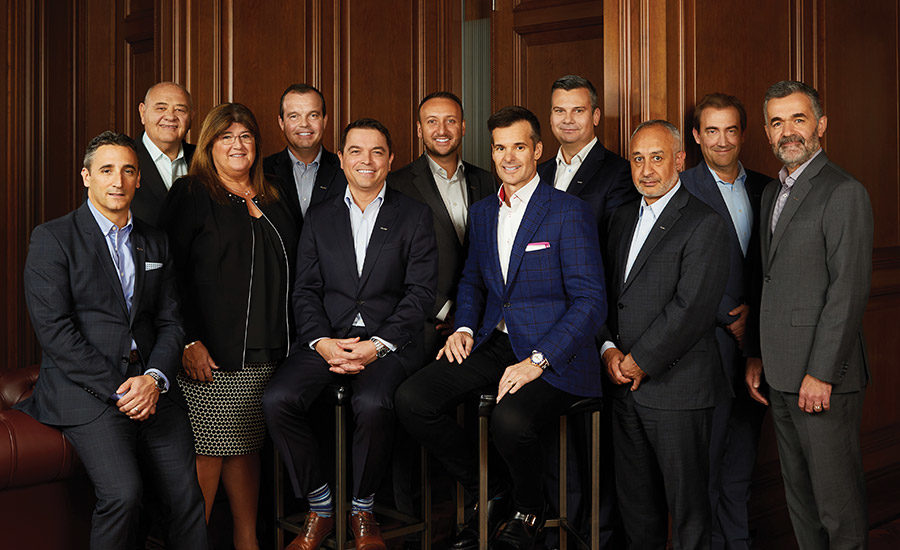













Like all other years in modern history, 1954 saw its share of notable events. It was the year that almost 2 million school children in the United States, Canada and Finland participated in field trials for the new polio vaccine developed by Jonas Salk; Roger Bannister of the U.K. became the first person to run a sub-4-minute mile; and actress Marilyn Monroe wed baseball legend Joe DiMaggio.
It was also the year that Dairy Foods’ 2019 Processor of the Year, Montréal-based Saputo Inc., got its start — albeit with considerable less fanfare. After leaving their home town of Montelepre, Italy, a few years earlier to start a new life in Canada, Giuseppe and Maria Saputo, along with their son Lino, began making Italian-style cheeses in a space rented at an existing Montréal cheese factory. Lino Saputo (Saputo Sr.) eventually took on the role of president and CEO.
What launched with only $500 worth of equipment and a bicycle for deliveries is now one of the world’s largest dairy processors — ranked No. 9 in the world on Rabobank’s Dairy Top 20 list and No. 2 on Dairy Foods’ 2019 Dairy 100 list of North American dairy processors. Saputo’s fiscal 2019 revenues topped $13.5 billion (in Canadian dollars).
And the company now has a strong global presence, with manufacturing operations not only in Canada, but also in the United States, Australia, Argentina and the U.K. In addition to its own branded products, Saputo produces offerings under retail and foodservice customers’ labels.
From private to public
Saputo has undergone a number of significant changes over the years. Notably, the company went public in 1997 — with Saputo Sr. remaining at the helm.
But that reality didn’t end the Saputo family’s involvement in the business. In 2004, Lino A. Saputo, Jr. succeeded his father as CEO, while Saputo Sr. stayed on as chair of the board. Following Saputo Sr.’s retirement in 2017, Saputo Jr. also took on the role of chair. Recently named Canada’s Outstanding CEO of the Year 2019, he leads and oversees the global Saputo business (see the sidebar below).

Dairy Division (Australia): Saputo recently added the Cracker Barrel* Infused Cheddar Jalapeno & Honeycomb variety to its Cracker Barrel Infused range. It is said to be an exciting and innovative product for cheeseboards. *Used under license.
The initial public offering (IPO) in 1997 marked the beginning of another major change, too: a strong period of international expansion for the company, Saputo Jr. explained.
“We were primarily a Canadian-oriented dairy business, mostly in cheese. And we had just gone public,” he said. “We knew that somewhere along the line we would outgrow Canada’s milk supply-managed system, so it was important for us to think about expanding in the dairy industry outside of the Canadian regulatory system.”
So when Saputo had the opportunity to buy a U.S. cheese company — Stella Foods — that was twice its size less than two months after the IPO, it didn’t hesitate. After all, Saputo already understood how to be a high-quality, low-cost processor and was familiar with U.S. regulations because it had been operating two smaller cheese plants in the country since the late 1980s, Saputo Jr. noted.
“We felt as a strong dairy player, we needed to have assets in the U.S.,” he said. “It was really an offensive move for us. We took over the assets of Stella — they were underperforming — and we turned them around and gained a lot of confidence with our turnaround plan and our ability to acquire effectively and integrate even more efficiently.”
A history of acquisitions
The Stella acquisition also whetted Saputo’s appetite for other acquisitions — both offensive and defensive — outside of Canada. In fact, the company has completed 32 acquisitions since 1997.

Dairy Division (UK): Launched in June 2019, Cathedral City 82 is a calorie-led range from Cathedral City, the U.K.’s No. 1 cheddar brand. It has 82 calories per 30-gram serving and is high in protein.
Working in Saputo’s favor is the fact that the company is highly selective and disciplined in its approach to acquisitions. In fact, since its IPO, it actually has evaluated more than 300 files, Saputo Jr. noted.
“It’s important for us to keep a level head,” he stated. “If we find things in the due diligence process that we believe are issues that are too big to overcome, we are prepared to walk away from an acquisition.”
Some of the most recent acquisitions include Australia’s Murray Goulburn Co-Operative Co. Ltd. in 2018, the U.K.’s Dairy Crest Group plc in 2019, and the specialty cheese business of Australia’s Lion Dairy & Drinks Pty Ltd in 2019. Saputo also recently acquired three more U.S. companies — the extended shelf-life dairy product activities of Southeast Milk Inc. (SMI) in 2017, Betin Inc. (doing business as Montchevre) in 2017 and F&A Dairy Products Inc. in 2018.
As Kai Bockmann, Saputo’s president and chief operating officer, explained, the acquisitions allow the company to enter new geographies or expand within existing ones.
“We tend to focus on the parts of the world where there are major dairy-producing regions,” he added. “We had our eye on Australia for over 12 years before materializing our first acquisition in that geography. … It allows us to have a beachhead to tap into the Asian markets, which are going to be a big source of growth for us as we move forward. … In Australia, we picked up the Devondale brand, which was a market-leading brand.”
The acquisitions also bring new capabilities to Saputo, Bockmann said, and allow the company to enter new product categories. For example, Dairy Crest gave Saputo a manufacturing presence in Europe and brought the company into areas of the infant formula category and ramped up its capabilities related to dairy ingredients and cheddar cheese.
“And in the U.K., Cathedral City is the No. 1 retail cheddar brand,” he added.
In the United States, the Montchevre acquisition enabled Saputo to broaden its presence in specialty cheese, as well as access a new customer base, said Terry Brockman, president and chief operating officer, Cheese Division (USA).
“We were able to offer our current customers a variety of new and exciting products that nicely round out our goat cheese offering,” he explained. “With the addition of the Montchevre retail brand, we maintained our leading market share position in the goat cheese category last fiscal year.”
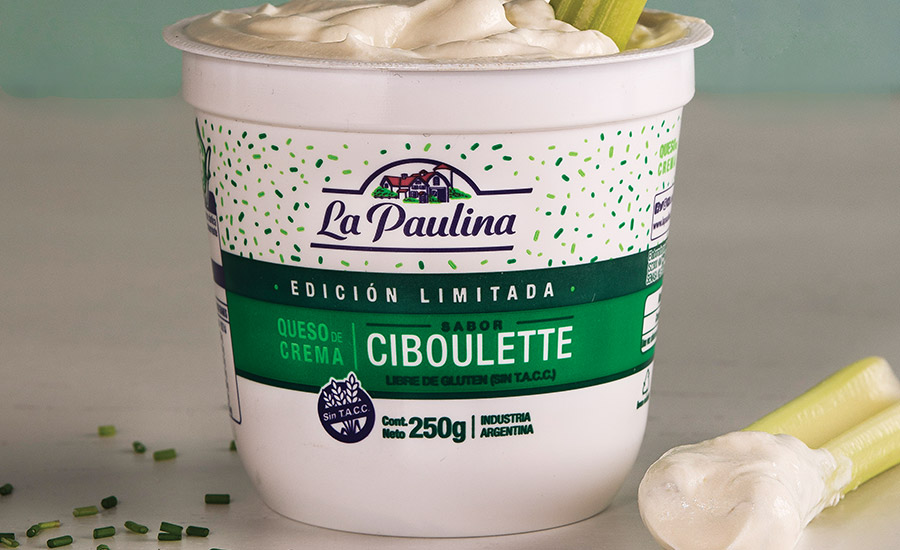
Dairy Division (Argentina): La Paulina Ciboulette cream cheese, a fresh and creamy product with notes of chives, launched in 2019.
The addition of F&A Dairy Products, meanwhile, enabled Saputo to expand its natural cheese offerings, Brockman said.
“Another important benefit was the access to a growing milk pool in the southwestern United States,” he noted, “which allowed us to geographically diversify our milk procurement base.”
As for the SMI acquisition, it opened the door for additional investment in new processing capabilities, as well as core product growth to enable Saputo to meet the evolving needs of its customers, said Paul Corney, president and chief operating officer, Dairy Foods Division (USA).
“In addition, the location in the southeastern United States has resulted in greater efficiency for our national distribution network and provided us a larger scale from which to serve our valued customers,” he pointed out. “In terms of integrating SMI into the Dairy Foods Division (USA), the Saputo operating model was integrated seamlessly. We made prudent capital investments to ensure the facility came up to Saputo standards, and we are now poised for future growth and success.”
Seamless — or almost seamless — integration appears to be the norm rather than the exception for Saputo’s acquisitions. As Bockmann explained, it helps that the Australian and U.K. cultures — and to a certain extent, the U.S. culture — are very similar to Canada’s.
Investing in assets, innovation
Saputo is worthy of admiration for more than its well-thought-out path to continued growth. The investments the company has made — and continues to make — in both its assets and product innovation are impressive as well.
On the asset side, Bockmann pointed out that Saputo lays claim to “a very strong balance sheet” that allows the company to reinvest in its businesses to improve operations and enhance capacities.
“We also have the ability to bring established technologies from other divisions into the integrated or newly acquired businesses,” he explained. “If you look at Argentina as an example, we spent well over $120 million in capital expenditures to bring new mozzarella capabilities and capacity to that platform.”
In Australia, Saputo recently invested to increase capacity in its main cheddar plant in Warrnambool, Bockmann noted. And it’s currently working to expand capacity in the U.K.

Cheese Division (USA): Montchevre Chèvre in Blue cheese was the very first cheese produced by Montchevre in 1988. Since then, it has continued to win awards and receive recognition from chefs and consumers around the country. The rindless cheese is made from prime-quality goat milk and aged more than 90 days, allowing the flavor of the goat milk to mature and blend in with the blue.
“When we acquire businesses, it’s all about bringing the best from across other divisions, established technologies and that sort of thing — bringing them to the recently acquired platforms and providing some necessary capital to support that,” he added.
Carl Colizza, president and chief operating officer (North America), said Saputo regularly reinvests in all of its North American assets, too, via a disciplined capital expenditure program.
“We have 48 facilities in North America, and we regularly reinvest in things that will touch employee health and safety — such as ergonomics or food safety — and continue to progress on our journey, as well as augment the efficacy and efficiency within our plants,” he said.
Saputo recently completed a major capital project at its blue cheese operation in Almena, Wis., Colizza noted, and is currently “very excited” about a Greenfield project in Port Coquitlam, British Columbia.
“It’s going to be the home of our Dairyland fluid milk brand, as well as future plant-based beverages,” Colizza noted.
And when it comes to product innovation, Saputo realizes that it must be at the leading edge of where the market is heading if it is to remain a growth engine for its customers’ businesses, Corney said.
“Investments in our Innovation Center in Dallas were foundational to accomplishing that objective,” he stated. “At this center, based on our extensive consumer research, we can create and formulate new products, validate them from a sensory and consumer acceptance perspective, and assist with all aspects of processing, packaging, development and launch.”
Saputo also boasts dedicated research and development personnel who travel the globe. According to Bockmann, they are always on the lookout for not only new product ideas, but also best practices in the form of technology.
That approach meshes with Saputo’s definition of innovation, which isn’t limited to new products and packaging. It’s also important to the company to embrace innovation within its supply chain processes, its administrative functions and more, Colizza pointed out.
But circling back to product innovation, the company looks to pursue projects that are aligned with the Saputo Promise, too (that promise consists of seven pillars that form the company’s approach to social, environmental and economic performance). That means pursuing trends on the nutritional front, addressing sustainability and social responsibility concerns, and more, Colizza said.
A commendable corporate citizen
Saputo’s mission goes beyond continued growth and innovation in products and processes. The Saputo Promise actually calls for the company to consider everything from animal husbandry and environmental sustainability to the communities in which it operates in its decision-making.
“In today’s world, in order to be an employer of choice, it’s more than just having a profitable business,” Saputo Jr. said. “It’s about being in the right industry, providing good foods for consumers. It’s about taking care of the employees while they’re here, providing them not just a job, but also a career. It’s also about giving back to the community.”

Dairy Foods Division (USA): In fiscal 2019, Saputo successfully transitioned its Friendship Dairies cottage cheese to a clean label formulation, simplifying its ingredients while maintaining the same taste and texture consumers love.
Speaking of giving back to the community, Saputo is certainly a standout. In 2018, for example, the company made a three-year financial commitment to 4-H Canada to encourage the next generation of dairy leaders. The organization was a natural fit for Saputo, according to Sandy Vassiadis, vice president, communications and corporate responsibility.
“They’ve done excellent work since their founding, and we are very aware that succession planning is a concern for those in agriculture,” she said. “We want to contribute to teaching kids the importance of caring for animals and also seeing that the sector is a future for them.”
Saputo works with youth to develop the local 4-H dairy clubs and provides funds for supplies and events, Vassiadis noted. It also helps with conferences and internships.
Saputo employees have taken part and embraced this initiative, as has the general public.
In addition to its work with 4-H Canada, Saputo has a long-standing partnership with the Grand défi Pierre Lavoie, a nonprofit organization representing one of the largest health movements in Québec. And the company recently expanded its partnership with La Tablée des Chefs, an organization dedicated to feeding those in need and developing crucial culinary education for young people in Canada. The goal is to make sure Saputo is doing its part to create healthier communities. Although Saputo provides significant financial support to both organizations, the partnerships are also a way for the company’s employees to get involved in worthwhile causes — and to improve their health.
“Employees partake and they become active,” Vassiadis explained. “They cook for the community; they learn about new things and apply them in their own households. So it’s a win-win.”

Dairy Division (Canada): New packaging for Saputo’s Armstrong cheese differentiates the cheese at-shelf via distinctive colors and photography and emphasizes the brand story by leveraging important pillars such as heritage.
Saputo’s health-minded community efforts aren’t limited to Canada. In the United States, for example, Saputo is involved in Action for Healthy Kids, helping to provide grant funding to schools in support of health and wellness initiatives. And the company boasts similar partnerships in Australia, Argentina and the U.K., Vassiadis noted.
An industry advocate
Saputo also believes in providing support to its own industry. Case in point: The company is one of four cosponsors of the new Dairy Protein Messaging Initiative, which aims to better promote milk-based proteins to consumers. The initiative is managed by the American Dairy Products Institute.
“As a leader in the dairy industry, we feel it’s important to collaborate with fellow players to promote the goodness of dairy and raise awareness around topics that contribute to the success and sustainability of our industry,” Brockman said. “We came together to create this initiative and consumer-facing campaign to fill a void in the promotion of milk-based proteins to consumers. The value of milk-based proteins is well-known within our industry, but we need to talk about these ingredients and their benefits to a wide audience.”
Saputo as a company aligns with the campaign’s principles and goals. Those include increasing the consumption of foods fortified with dairy protein, raising awareness of dairy proteins, communicating dairy protein’s advantages over their plant-based protein counterparts, and articulating to consumers a positive, impactful and informative story.
Planning for the future
Looking back over the past 65 years of operations, Saputo’s management team and approximately 17,200 employees have many reasons to be proud. That said, the company isn’t resting on its laurels. During the next five to 10 years, it will continue to embrace change via new product development; continued improvement in sustainability, technology and other areas; and, of course, strategic acquisitions. However, near-term acquisitions likely will be focused on the company’s existing geographies.
What won’t change is Saputo’s longstanding unique and commendable culture, which embraces open dialogue and allows every employee to be heard and respected.
“We work very, very hard every single day to make our employees feel like they’re an extended member of our family — that’s the way my grandfather built the business,” said Saputo Jr. “That’s the way my father ran the business, and that’s the way I grew up in it.
“Hierarchy is not that important to us,” he added. “It’s a question of making the right decision because it’s the right thing to do, irrespective of where the idea came from.”
Looking for a reprint of this article?
From high-res PDFs to custom plaques, order your copy today!




